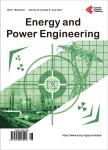Comparative Study of Performances of a Single-Cylinder Diesel Enginefueled with Pure Diesel and Blends of Biodiesels/Pure Diesel
Comparative Study of Performances of a Single-Cylinder Diesel Enginefueled with Pure Diesel and Blends of Biodiesels/Pure Diesel作者机构:Center for Research in Energy and Applied Informatics (CREI) Faculty of Polytechnics Université Kongo Mbanza-Ngungu DRC Laboratory of Analytical Chemistry Faculty of Sciences Université de Kinshasa Kinshasa DRC Laboratory of Bioorganic Research (Larebiorg) Faculty of Pharmaceutical Sciences Université de Kinshasa Kinshasa DRC Center for Research in Renewable Energies (CRRE) Faculty of Polytechnics Université de Kinshasa Kinshasa DRC
出 版 物:《Energy and Power Engineering》 (能源与动力工程(英文))
年 卷 期:2021年第13卷第3期
页 面:111-125页
学科分类:07[理学] 0701[理学-数学] 070101[理学-基础数学]
主 题:Diesel Monocylinder Engine Performances Biodiesels-Gasoil Blends
摘 要:In this study, the principal objective is to compare the performances of an air-cooled one cylinder, four-stroke direct injection diesel engine using the blends (5% by volume B5, 10% by volume B10) of diesel and biodiesels derived respectively from palm oil, castor oil and raphia sese De Wild oil with pure diesel. All the biodiesels used in this work come from the plant species of the democratic republic of Congo as listed above. The engine performances (power, torque and brake specific consumption)at different engine speeds were determined at both full and partial loads. According to experimental results, the increments in the power output and torque when the mixtures of diesel and biodiesels were used andwere observed. On the other side, the specific fuel consumption of the mixtures is higher than that of pure dieselalthough the calculated lower heating values are almost within the same range for the all studied fuels. Finally, in partial load 1/1, pure diesel blended with biodiesels B5 derived from castor oil presented high specific brake consumption values compared to the other fuels while B10 from the same oil presents low brake specific consumption values for power greater than 3.2 kW.



